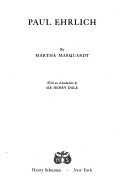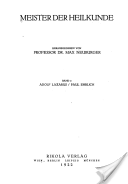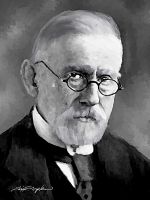Paul Ehrlich
Physician, Scientist. Immunologist, Hematology pioneer. Founded Chemotherapy. Classified stains. Stained tissues, blood cell granules, tubercle bacillus. Standardized sera. Idea: Drugs’ chemical constitution related to action, affinity for cells against which directed.
“Schwann established cell as biological unit. Concept of cell is axis around which whole modern science of life revolves”
Biography
Books
Publications
Death
Dissertation/Thesis
History of Discovery & Quotations
Honoring Paul Ehrlich
Images
Videos
Biography

Title:
Paul Ehrlich Volume 19 of Life of Science library
Author:
Martha Marquardt
Publisher:
Schuman, 1951
Length:
255 pages
Subjects Summary:
Biography & Autobiography Medical
The indefatigable industry shown by Ehrlich throughout his life, his kindness and modesty, his lifelong habit of eating little and smoking incessantly 25 strong cigars a day, a box of which he frequently carried under one arm, his invariable insistence on the repeated proof by many experiments of the results he published, and the veneration and devotion shown to him by all his assistants have been vividly described by his former secretary, Martha Marquardt, whose biography of him has given us a detailed picture of his life in Frankfurt. In Frankfurt the street in which his Institute was situated was named Paul Ehrlichstrasse after him, but later, when the Jewish persecution began, this name was removed because Ehrlich was a Jew. After the Second World War, however, when his birth-place, Strehlen, came under the jurisdiction of the Polish authorities, they renamed it Ehrlichstadt, in honour of its great son.
The indefatigable industry shown by Ehrlich throughout his life, his kindness and modesty, his lifelong habit of eating little and smoking incessantly 25 strong cigars a day, a box of which he frequently carried under one arm, his invariable insistence on the repeated proof by many experiments of the results he published, and the veneration and devotion shown to him by all his assistants have been vividly described by his former secretary, Martha Marquardt, whose biography of him has given us a detailed picture of his life in Frankfurt. In Frankfurt the street in which his Institute was situated was named Paul Ehrlichstrasse after him, but later, when the Jewish persecution began, this name was removed because Ehrlich was a Jew. After the Second World War, however, when his birth-place, Strehlen, came under the jurisdiction of the Polish authorities, they renamed it Ehrlichstadt, in honour of its great son.

Title:
Author:
Adolf Lazarus
Publisher:
Rikola Verlag, 1922
Length:
88 pages
Language:
GERMAN

Find in a library near you. In the OCLC Worldcat website search box, copy and paste the name of the laureate. Click. In the list of books, click the book of interest to you. Your computer will probably use a 5-digit zip code to locate its physical location. Scroll down to libraries near you which possess the book. Possibly there may be more than one person with the same name.
